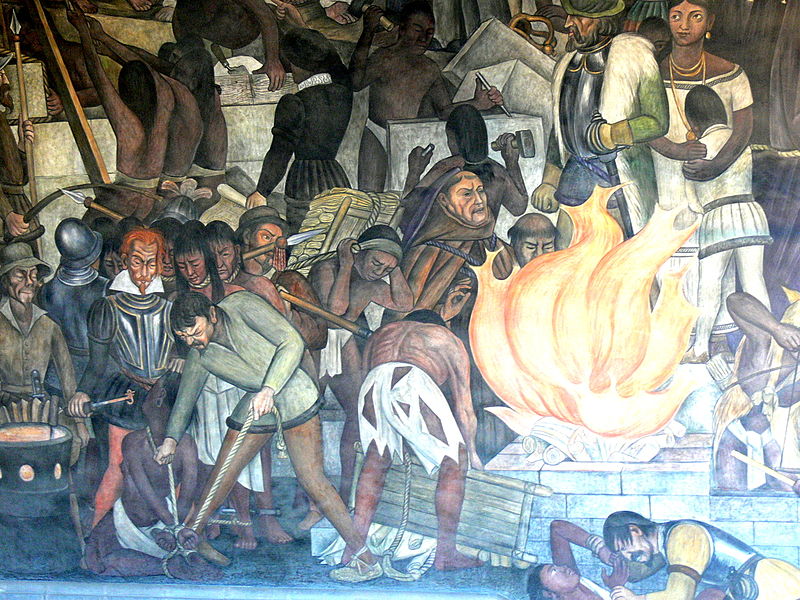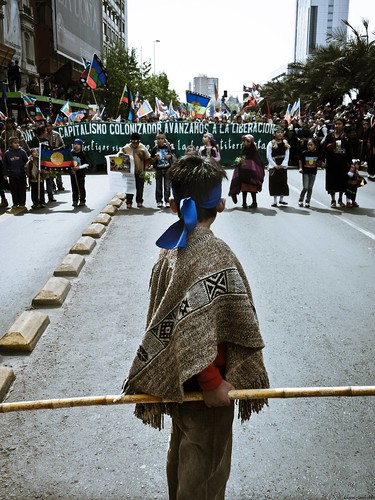
Theories of (de)coloniality raise profound questions and possibilities for the study of religion. Decolonial theory names and challenges enduring social, economic, political, and epistemic Eurocentrism that continues to define modernity even beyond the era of direct colonial domination. Bringing a decolonial lens to Contending Modernities opens up crucial new sites of analysis and engagement, as we consider how the academic study of religion—and the concept of religion itself—has helped to perpetuate modernity’s violences, and might yet contribute to the project of decoloniality. Contending Modernities’ new series, “Decoloniality and the Study of Religion,” brings together preliminary reflections from thinkers exploring the intersection between decolonial thought and the academic study of religion, with future posts planned that will delve into different sub-disciplines in the study of religion such as comparative religious ethics, philosophy of religion, and theory and method in the study of religion.
The Co-Constitution of Racial and Religious Difference
The essays in this series have two goals. First, they show how modern, Western conceptions of religion reinforce a global system of power that decolonial thinkers refer to as modernity/coloniality, revealing the complicity of the academic study of religion in these enduring patterns of violence. As An Yountae’s essay shows, decolonial thinkers draw an explicit linkage between the emergence of the category of religion itself and the simultaneous construction of racial and geographical (European/non-European) difference. In particular, decolonial thinkers point to 1492 and the completion of the settler-colonial Christian conquest of the Iberian Peninsula and the subsequent expulsion or forced conversion of the peninsula’s Jewish and Muslim inhabitants. In the aftermath of the fall of Granada, Jews and Muslims who converted to Catholicism remained persecuted as marranos (“swine”) under suspicions of crypto-Jewish and crypto-Islamic practices, revealing a novel co-mingling of religious and racial difference articulated in contrast with its constitutive (white/Christian/European) other through an emergent racial logic of blood purity. These interlinked Iberian constructions of racial and religious difference were subsequently globalized through European colonial encounters with indigenous peoples on the land that would become the Americas, and through the explosion of the transatlantic trade in enslaved Africans.
In the centuries since, this foundational construction of religious difference has functioned alongside interrelated and intersecting constructions of racial, gender, and geographical difference to frame systems of social, economic, and political domination—the conditions of coloniality—that reinforce the supremacy of a Eurocentered modernity over and against the perceived inferiority of those it has relegated to its darker side. As Kwok Pui Lan’s essay illustrates, the colonial construction of religion vis-à-vis the referent of a Eurocentered modernity has also been subsequently transmuted through modernity’s “secularist myth,” further reinforcing the othering of non-Western religions as backwards, irrational, and even violent in contrast to the modern, rational, and supposedly peaceful West.
Against this historical backdrop, the academic study of religion has itself functioned as an active participant in the perpetuation of modernity/coloniality’s Eurocentric hierarchy of knowledge production. Both during and beyond the era of direct European colonization, Western scholars of religion have played an active role in the imposition of Western concepts that have invisibilized non-Western ways of knowing and being in the world, flattening the epistemologies and ontologies of non-Western peoples within universalizing categories to fit within modernity’s self-narration. The Western academic delineation of “culture” from “religion” as distinct objects of study functioned through the age of colonial expansion to reductively categorize any number of non-Western epistemologies and constituted ontologies—that is, lived non-Western ways of knowing and being in the world—into the “backwards” or “primitive” categories of folklore, myth, and superstition. Nelson Maldonado-Torres’s essay elucidates a similar Eurocentric logic at work in the construction of the category of non-Western “world religions,” a thinly-veiled proxy indicator for racial, geographic, and even temporal (not “fully modern”) difference that marks the non-Christian religious as constitutively outside the modern West. As Tomoko Masuzawa explains in The Invention of World Religions: Or, How European Universalism Was Preserved in the Language of Pluralism (also quoted by Maldonado-Torres), rather than affirming global religious pluralism as Western scholars might claim, the imposition of the category of “world religions” itself naturalizes an explicitly Christian theological lens for understanding what constitutes a religion in the first place, while simultaneously inscribing all non-Christian religions within a hierarchal system of rank-ordering that continually reaffirms (modern, Western) Christian hegemony. Through these two interpretive categories—world religions and culture—Western scholars thus continue to advance narratives of racialized religious difference whose shared logics are traceable to the encounters of 1492, dividing non-Europeans into those possessed of the wrong religions (Iberian Jews and Muslims first, and later adherents to any of the various non-Christian “world religions”) and those possessed of no religion recognizable as such (especially the indigenous peoples of the Americas).
De-Linking Religion From Modernity/Coloniality

The second goal of these essays is to contribute to a burgeoning focus on the possibilities of imagining religion de-linked from the universalizing logics of modernity/coloniality. Such an approach rejects a modern Western conception of religion as a unitary, discrete variable that can be neatly disaggregated from other facets of human experience—what Kwok Pui Lan describes as “sui generis and separated from other cultural, social, and political aspects.” Instead, while highlighting the insufficiency of an unreconstructed understanding of religion, these essays also indicate the possibility of reconceptualizing religion in a way not reducible to the all-encompassing epistemological claims of a Westernized modernity. To this end, the essays in this series indicate the vital importance of the many ways of knowing and being in the world that have been suppressed in part through the use of the modern, Western category of religion itself.
Despite religion’s problematic genealogy as a category of Western analysis, these essays indicate the vital roles that decolonized accounts of religion might play in the formation of what decolonial thinkers refer to as “loci of enunciation“—a sense of positionality that reflects how one is acted upon by the global colonial matrix of power—from which ethical and political alternatives to modernity/coloniality can be imagined and enacted. Abdulkader Tayob’s essay in particular highlights the possibilities of a decolonized approach to Islamic Studies—and the study of religion more broadly—rooted not in the universalizing comparative hermeneutics of the colonizers, which presume a neutral vantage point that somehow transcends their subjects of study, but rather in the critical intellectual productions of Muslim communities themselves. Such an approach, to borrow a phrase from Tayob, helps to effect the provincialization of modern, Western approaches to the study of religion without simultaneously re-exceptionalizing them, opening the doors to dialogical possibilities between “other ways of thinking of religion and the religious.”
Decolonial thought unmasks the histories of violence that undergird Europe’s self-appointed status as the sole producer and purveyor of knowledge. Confronting these histories and their enduring structural manifestations requires that we also confront the epistemic legacies of colonialism that inhere within the Western academy. In the study of religion, this includes confronting the Eurocentrism of the field’s definitional concepts and categories and admitting the roles they have played in legitimizing the historic and enduring violences of Europe’s colonial projects. To that end, these essays offer an important and timely intervention into conversations on how the academic study of religion has participated in the maintenance of the modern/colonial world-system’s social, political, economic, and epistemic hierarchicalizations, while also indicating ways forward for the decolonial study of religion.


The study of religion in this article assumes a Eurocentris (Western, Christian) religion.
Do you also know of historical studies interrelating religion and decoloniality, but now from an Arabcentris (Eastern, Islam) religion.
Thank you!